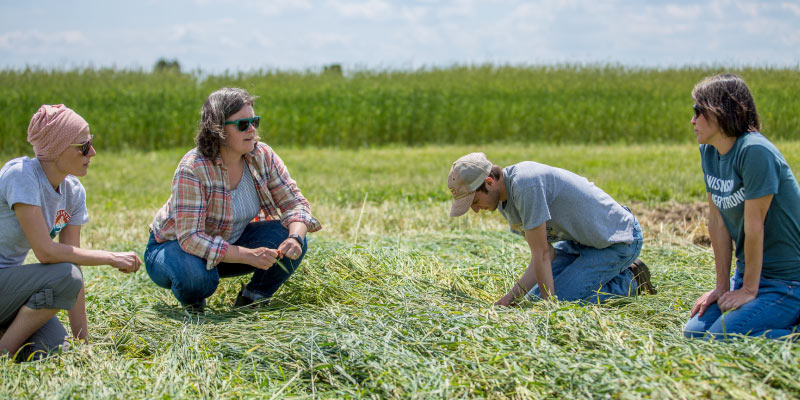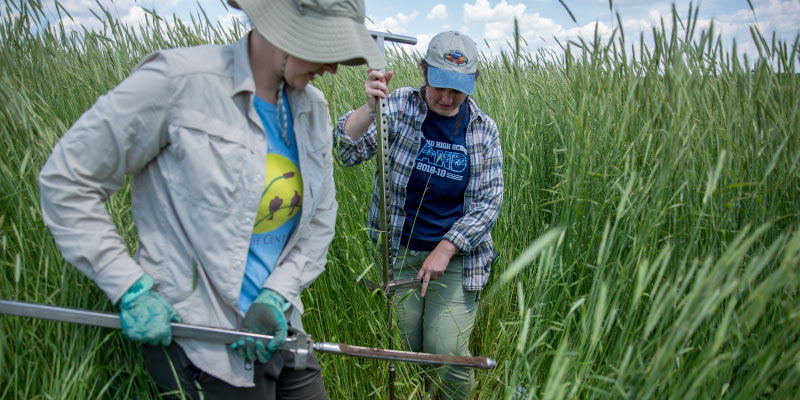
Erin Silva’s office may be on the University of Wisconsin – Madison campus, but her current work extends to Tribal Nations across the state. Silva and a few graduate students are collaborating with the Ohe·láku, a nonprofit organization of Oneida families, and other Tribal partners to promote food sovereignty and security across Wisconsin’s Indigenous Tribes.
As an undergraduate, Silva studied biology and chemistry at the University of Wisconsin–Stevens Point before pursuing a PhD in horticulture at Washington State University. While pursuing her undergraduate degree, Silva worked at several UW–Madison labs that focused on agricultural research, which piqued her interest in combining her education in ecology and the environment with horticulture and food production.
Silva further meshed these concepts together at Washington State, where she worked on a project that focused on understanding pollinator behavior. “I liked how I was able to implement my background in ecology and the environment into an agricultural setting,” says Silva. After graduating with her PhD, Silva worked at New Mexico State University where she was able to expand on her interest of bringing ecological concepts into organic agriculture education.
In 2006, Silva returned to Wisconsin to accept a position as an organic researcher with UW–Madison’s College of Agricultural and Life Sciences (CALS). Since then, she has expanded her roles and is now an affiliate of the Nelson Institute for Environmental Studies, a professor and state extension specialist in organic and sustainable cropping systems in CALS’s Department of Plant Pathology, and a director for the college’s Center for Integrated Agricultural Systems.
To Silva, the Nelson Institute’s focus on environmental studies, land ethics, and the integration of interdisciplinary approaches is what really sets it apart. “I was drawn to how the Nelson Institute brings in faculty across various disciplines and stresses the importance of interaction between the biophysical aspects of land management with the social and community side of how those decisions are adopted on the landscape,” she says.

Silva continues to be involved in projects that emphasize how academic research can be applied within communities. To Silva, “being a land-grant university means that we should be aligning with and uplifting the Wisconsin Idea by working across the Wisconsin landscape.” In her agricultural work, Silva is deliberate about working directly with farmers, involving the community in research, and listening to people’s observations and needs.
Recently, Silva and her graduate student, Daniel Hayden, have been applying these interdisciplinary concepts to a research collaboration with the Ohe·láku. The group is hoping to develop a more intentional approach to growing corn – one that aligns with their traditional production of corn and the ecological knowledge that accompanied it. They’re also trying to bring back some of the historic varieties of corn that the Oneida Nation once grew.
Silva refers to this partnership as a “codeveloped grassroots effort” that began as a conversation about how UW–Madison’s organic agricultural research can help meet some of the needs and goals of the Ohe·láku. This project has contributed to the blending of Traditional Ecological Knowledge with modern organic practices, helping to support the Ohe·láku’s traditional corn production and their food sovereignty goals. Silva also says that all of the food being produced during research and in the research plots is being distributed back into the community. “Through this project, we’re not only bringing back the precolonization historic Tribal foods that support the health and well-being of Tribal members, but also putting food into the homes of people who need food security support,” she says.
Moving forward, Silva hopes that the food sovereignty partnership between UW–Madison researchers, the Ohe·láku, and other Tribal Nations continues to thrive. She says, “I want us to be able to enhance the student experience of colearning, both by providing opportunities for Tribal students to learn and explore at UW–Madison and by providing UW–Madison students with opportunities to see the power of cogenerating knowledge and listening to the communities we’re working with.”